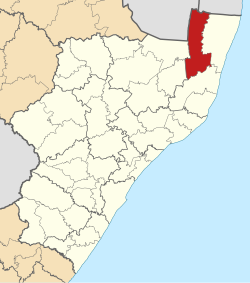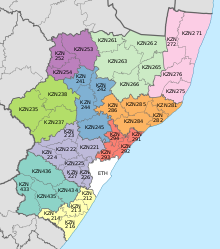world.wikisort.org - South_Africa
Jozini is an administrative area in the Umkhanyakude District of KwaZulu-Natal in South Africa. Significant portions of Jozini have been neglected in terms of economic development. There is a great disparity between the level of service and infrastructure provision between settlement nodes, such as the towns of Mkuze and Jozini, and the surrounding rural areas. Most of the rural area is associated with a lack of development, poverty and poor service provision.[3]
Jozini | |
|---|---|
Local municipality | |
 Seal | |
 Location in KwaZulu-Natal | |
| Country | South Africa |
| Province | KwaZulu-Natal |
| District | uMkhanyakude |
| Seat | Jozini |
| Wards | 20 |
| Government | |
| • Type | Municipal council |
| • Mayor | Delani Mabika (IFP) |
| Area | |
| • Total | 3,442 km2 (1,329 sq mi) |
| Population (2011)[2] | |
| • Total | 186,502 |
| • Density | 54/km2 (140/sq mi) |
| Racial makeup (2011) | |
| • Black African | 99.2% |
| • Coloured | 0.1% |
| • Indian/Asian | 0.2% |
| • White | 0.3% |
| First languages (2011) | |
| • Zulu | 95.1% |
| • English | 1.2% |
| • Southern Ndebele | 1.1% |
| • Other | 2.6% |
| Time zone | UTC+2 (SAST) |
| Municipal code | KZN272 |
Main places
The 2001 census divided the municipality into the following main places:[4]
| Place | Code | Area (km2) | Population |
|---|---|---|---|
| Ingwavuma | 53301 | 1.72 | 1,089 |
| Jozini | 53312 | 0.45 | 543 |
| Manukuza/Jobe | 53303 | 280.65 | 18,277 |
| Mathenjwa | 53304 | 435.13 | 26,332 |
| Mkuze | 53305 | 1.04 | 1,834 |
| Mngomezulu | 53306 | 277.82 | 18,676 |
| Myeni/Ngwenya | 53307 | 138.34 | 10,146 |
| Myeni/Ntsinde | 53308 | 172.91 | 16,524 |
| Ndumu Game Reserve | 53309 | 110.43 | 72 |
| Nyawo | 53310 | 909.85 | 68,148 |
| Sqakatha | 53311 | 238.22 | 19,818 |
| Remainder of the municipality | 53302 | 523.02 | 2,628 |
Politics
The municipal council consists of forty-five members elected by mixed-member proportional representation. Twenty-three councillors are elected by first-past-the-post voting in twenty-three wards, while the remaining twenty-two are chosen from party lists so that the total number of party representatives is proportional to the number of votes received.
In the election of 1 November 2021 the Inkatha Freedom Party (IFP) won a majority of twenty-four seats.
The following table shows the results of the 2021 election.[5]
| Party | Ward | List | Total seats | |||||
|---|---|---|---|---|---|---|---|---|
| Votes | % | Seats | Votes | % | Seats | |||
| Inkatha Freedom Party | 31,073 | 50.56 | 19 | 32,556 | 53.64 | 5 | 24 | |
| African National Congress | 20,739 | 33.74 | 2 | 22,253 | 36.66 | 14 | 16 | |
| Economic Freedom Fighters | 2,617 | 4.26 | 0 | 2,884 | 4.75 | 2 | 2 | |
| Independent candidates | 5,485 | 8.92 | 2 | 2 | ||||
| Academic Congress Union | 981 | 1.62 | 1 | 1 | ||||
| Democratic Alliance | 340 | 0.55 | 0 | 348 | 0.57 | 0 | 0 | |
| National Freedom Party | 290 | 0.47 | 0 | 356 | 0.59 | 0 | 0 | |
| United Christian Democratic Party | 264 | 0.43 | 0 | 244 | 0.40 | 0 | 0 | |
| Independent Alliance | 56 | 0.09 | 0 | 421 | 0.69 | 0 | 0 | |
| African Transformation Movement | 190 | 0.31 | 0 | 224 | 0.37 | 0 | 0 | |
| Abantu Batho Congress | 123 | 0.20 | 0 | 138 | 0.23 | 0 | 0 | |
| United Democratic Movement | 103 | 0.17 | 0 | 105 | 0.17 | 0 | 0 | |
| African Christian Democratic Party | 64 | 0.10 | 0 | 94 | 0.15 | 0 | 0 | |
| National People's Front | 78 | 0.13 | 0 | 48 | 0.08 | 0 | 0 | |
| Black First Land First | 31 | 0.05 | 0 | 21 | 0.03 | 0 | 0 | |
| Democratic Union Plus | 9 | 0.01 | 0 | 20 | 0.03 | 0 | 0 | |
| Total | 61,462 | 100.00 | 23 | 60,693 | 100.00 | 22 | 45 | |
| Valid votes | 61,462 | 98.74 | 60,693 | 97.83 | ||||
| Invalid/blank votes | 784 | 1.26 | 1,344 | 2.17 | ||||
| Total votes | 62,246 | 100.00 | 62,037 | 100.00 | ||||
| Registered voters/turnout | 103,712 | 60.02 | 103,712 | 59.82 | ||||
References
- "Contact list: Executive Mayors". Government Communication & Information System. Archived from the original on 14 July 2010. Retrieved 22 February 2012.
- "Statistics by place". Statistics South Africa. Retrieved 27 September 2015.
- "KwaZulu-Natal Top Business | Jozini Municipality". www.kzntopbusiness.co.za.
- "Lookup Tables - Statistics South Africa".
- "Election Result Table for LGE2021 — Jozini". wikitable.frith.dev. Retrieved 2021-11-28.
External links
Другой контент может иметь иную лицензию. Перед использованием материалов сайта WikiSort.org внимательно изучите правила лицензирования конкретных элементов наполнения сайта.
WikiSort.org - проект по пересортировке и дополнению контента Википедии
